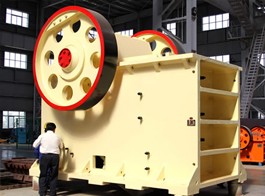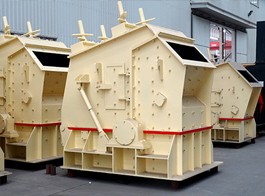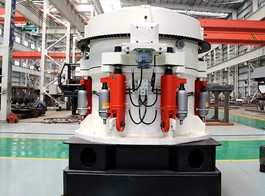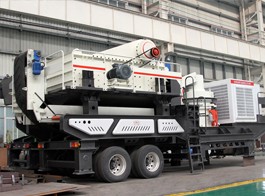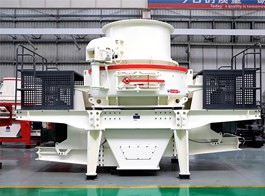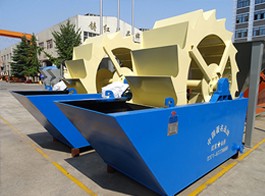Hot Products
Acoustics monitoring prevents downtime at Quarry
E-mail: market@hxjq.comBy carrying out regular condition monitoring checks on critical rotating plant and machinery, CNES has helped the Shapfell limestone quarry in Cumbria maintain its output, efficiency and profitability
The CNES condition monitoring team has been working closely with Cumbria-based Shapfell Lime Quarry for more than 12 years now, providing regular (monthly) patrol monitoring at the site, using a range of condition monitoring equipment and techniques, including handheld acoustic monitoring devices and vibration monitoring systems.
On a recent patrol monitoring visit, an engineer from CNES discovered unusually high readings on the primary crusher at the site, which raised concerns.
Through further investigation using acoustic and vibration analysis systems, the CNES engineer discovered that the unusual noise levels and irregular readings were related to a fault on one of the main bearings of the primary crusher, which had been running for more than 30 years.
Significant wear and damage were found on the inner raceway of the bearing.
By analysing the results, CNES was able to advise the Shapfell maintenance team when it should plan to replace the bearing.
Shapfell maintenance engineers were mobilised and the bearing replacement took place at a scheduled plant shutdown period, without causing any major disruption to the crushing process.
Ian Taylor, Business Development Engineer for Plant Condition Monitoring at CNES, comments: 'By using our extensive knowledge and experience of condition monitoring tools and techniques, our engineers were able to detect the fault on the bearing before it failed.
For this particular site, we used handheld acoustic monitoring meters.
The bearing was replaced within one week during a shutdown period, so there were no disruptions to production.
If we hadn't spotted the bearing problem and it had failed during operation, the plant would have lost at least two weeks' production, while the bearing was replaced and the required manpower and lifting gear were mobilised on site'.
At Shapfell, the first stage in the production of lime is the quarrying of the limestone itself.
The quarrying of the limestone takes place on a 47-hectare site, one mile east of the Lime Works.
Drilling and blasting in the quarry are undertaken by sub-contractors, under the strict control of Shapfell Quarry Management.
The average face height is 18 metres and blasts of between 10 - 30,000 tonnes of stone are carried out.
The shot stone is loaded and transported by dump trucks through a series of internal roads to the Crushing Plant.
In the crushing plant, limestone is crushed in a Primary Jaw Crusher, screened and then transported to the Secondary Roll Crusher.
Further screening takes place, with the small material being used primarily in the iron making process or sold locally as stone products.
The larger limestone, suitable for the kilns, is transferred to an outdoor stockpile.
Limestone from this pile is fed into a Washing Plant, where scrubbers, screens and thickeners are used to remove contamination and produce a clean raw material for burning in the kilns.
As Ian Taylor continues: 'When it comes to monitoring critical rotating plant and machinery, companies decide to work with CNES because we have the necessary skills and experience in choosing and understanding the various fixed and portable condition monitoring tools and techniques that are available - whether it is vibration, acoustics or thermography - and then deploying the correct tools for the job'.
Paul Wright, Engineering Manager at Shapfell Limestone Quarry comments: 'CNES has helped us considerably over the last ten years or so.
By understanding which condition monitoring technique is appropriate for maintaining each piece of machinery or bearing, we can maintain output, efficiency and profitability of the plant at all times.
Our own maintenance team has also been able to learn from CNES engineers'.
CNES is also helping Shapfell monitor and maintain blower systems at the site.
The blowers supply combustion and cooling air to the lime kilns, so are critical.
If they seize up due to excess dust particles building up on the surface of the rotor blades, the equipment can break down, causing downtime and disruption to production.
Patrol monitoring of the blowers, using vibration monitoring and acoustics techniques, again, means that CNES is able to predict faults before they cause serious damage to the blowers and losses in production.
Other companies in the quarrying, mineral processing and cement manufacturing sectors are using CNES technical expertise and subcontract manufacturing services to monitor critical plant and also to refurbish existing equipment.
Starting out as a supplier of rolled steel kiln sections to these companies, CNES now offers complete overhaul services and a full range of condition monitoring, plus asset management services.
CNES has the required workshop facilities to carry out a complete range of overhaul services to quarry screens, crushers and asphalt coating drums for the Quarrying sector.
Screens can be removed from site, dismantled and inspected in the workshops.
A typical contract includes welding and refabricating the decks and main frames, replacing shake-proof fasteners, overhauling exciter units or refurbishing eccentric shafts and bearing housings.
Completely overhauled screens can be reinstalled and commissioned at the customer's site, with fixed condition monitoring systems installed if required.
CNES also carries out complete overhaul of jaw or gyratory crushers; the manufacture of cones, bowls or shafts; and the overhaul of mobile crushing plant.
Asphalt coating drums can also be inspected, overhauled and recommissioned to suit tight outages.
For more information on CNES Engineering services, which include a toolbox of condition monitoring techniques and systems, please visit the website.
Corus Northern Engineering Services (CNES) is the maintenance, condition monitoring and engineering services company within the Corus Group.

